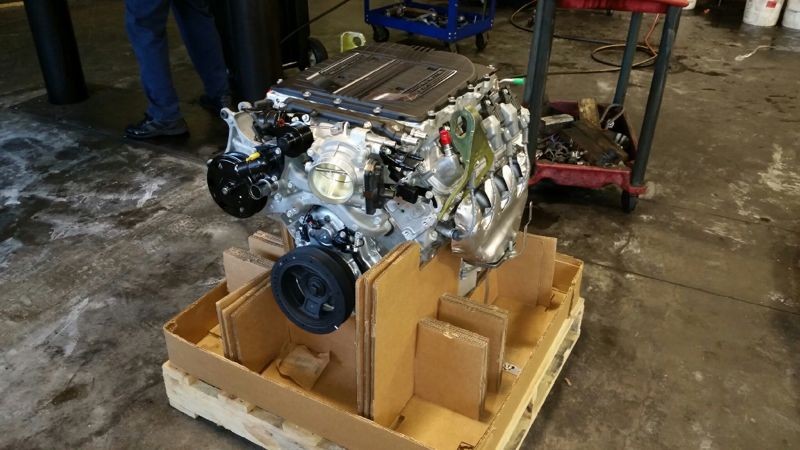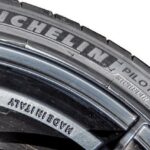The automotive world was buzzing with anticipation for the 2015 Corvette Z06, and for good reason. Boasting a monstrous supercharged engine, the Z06 promised unparalleled performance. However, as with any complex machine, unforeseen issues can arise. In late December 2014, the Corvette community witnessed the first reported engine failure in a 2015 Z06, owned by the Corvette Forum member “lawdogg149”. This incident sparked discussions about the reliability of the high-performance Corvette Z06 Engine and the implications for future models.
Lawdogg149 shared his unfortunate experience on the Corvette Forum, detailing the engine trouble he encountered with his brand-new, unmodified Z06, which had only clocked 891 miles. He was in the process of properly breaking in the car, preparing for a track event. During a moderate acceleration from 35 mph, shifting before redline, disaster struck. “Boom — the car began knocking,” Lawdogg reported. Upon inspection, he identified a “loud knock coming from the No. 6 cylinder area along with a serious, grinding, metal-on-metal sound coming from the supercharger area.” This certainly pointed towards a catastrophic Corvette Z06 engine failure.
The servicing dealer confirmed the initial diagnosis, pinpointing a valvetrain failure in the No. 6 cylinder. Crucially, the dealer was instructed by General Motors (GM) not to disassemble the engine further, as it required a comprehensive evaluation by the manufacturer. This indicated the seriousness of the issue and GM’s proactive approach to understand the root cause of this Corvette Z06 engine problem.
Image: The replacement LT4 engine for Lawdogg149’s 2015 Corvette Z06, delivered directly from Bowling Green, showcasing GM’s swift response to the engine failure.
The heart of the 2015 Corvette Z06 is the LT4, a 6.2L supercharged V8 engine. This powerhouse delivers a staggering 650 horsepower and 650 lb-ft of torque, making it one of the most potent engines in its class. The sheer force and complexity of this Corvette Z06 engine mean that any failure, especially in the early stages of ownership, is a significant concern for enthusiasts and potential buyers. The LT4 is a marvel of engineering, combining direct injection, Active Fuel Management (cylinder deactivation), and continuously variable valve timing to balance power and efficiency. However, as a first-year production engine, teething problems are not entirely unexpected, though certainly unwelcome.
The news of Lawdogg’s Corvette Z06 engine failure resonated deeply within the Corvette community. Forum member “Denstoy968” poignantly captured the collective sentiment, stating, “You know that feeling you get when you see another guy getting kicked in the balls? I just got that reading this, especially with my Z06 on its way.” This visceral reaction underscores the emotional connection Corvette owners have with their vehicles and the shared disappointment over such mechanical setbacks.
Despite the setback, there was a silver lining. GM promptly stepped up to address the issue, arranging for a complete Corvette Z06 engine replacement under warranty. This swift action was met with relief and appreciation from Lawdogg and the forum community. Had Lawdogg been responsible for the cost of a new LT4, estimated to be around $24,000, the situation would have been far more distressing. GM’s warranty coverage highlighted their commitment to customer satisfaction and confidence in their product, even with a sophisticated and powerful engine like the Corvette Z06 engine.
It’s important to note that Lawdogg was not engaging in any abusive driving behavior. He explicitly stated that he was diligently following the break-in procedures, dispelling any assumptions that driver error contributed to the Corvette Z06 engine failure. This reinforces the notion that this was likely an isolated incident, possibly due to a manufacturing defect or component failure within the engine itself.
Image: Lawdogg149’s 2015 Corvette Z06 parked next to a Dodge Viper, capturing a moment before the unfortunate engine incident, and prompting questions about the reliability of high-performance sports cars.
The incident naturally sparked a broader discussion about engine reliability in modern high-performance cars. In an era of advanced automotive engineering and stringent quality control, should a meticulously maintained Corvette Z06 engine fail so early in its life? Some forum members voiced concerns about the implications for other LT4 engines, including those destined for the 2016 Cadillac CTS-V, which also utilized this potent powerplant.
Ultimately, while the first reported Corvette Z06 engine failure was undoubtedly concerning, GM’s responsible handling of the situation and the subsequent engine replacement offered reassurance. It served as a reminder that even in the realm of high-performance vehicles, unforeseen issues can occur. However, the robustness of warranty coverage and the manufacturer’s responsiveness are crucial factors in maintaining customer trust and the long-term reputation of models like the Corvette Z06 and its impressive LT4 engine.
What are your thoughts on engine reliability in modern performance cars? Share your opinions on the forum.
Original article source: CorvetteForum.com


